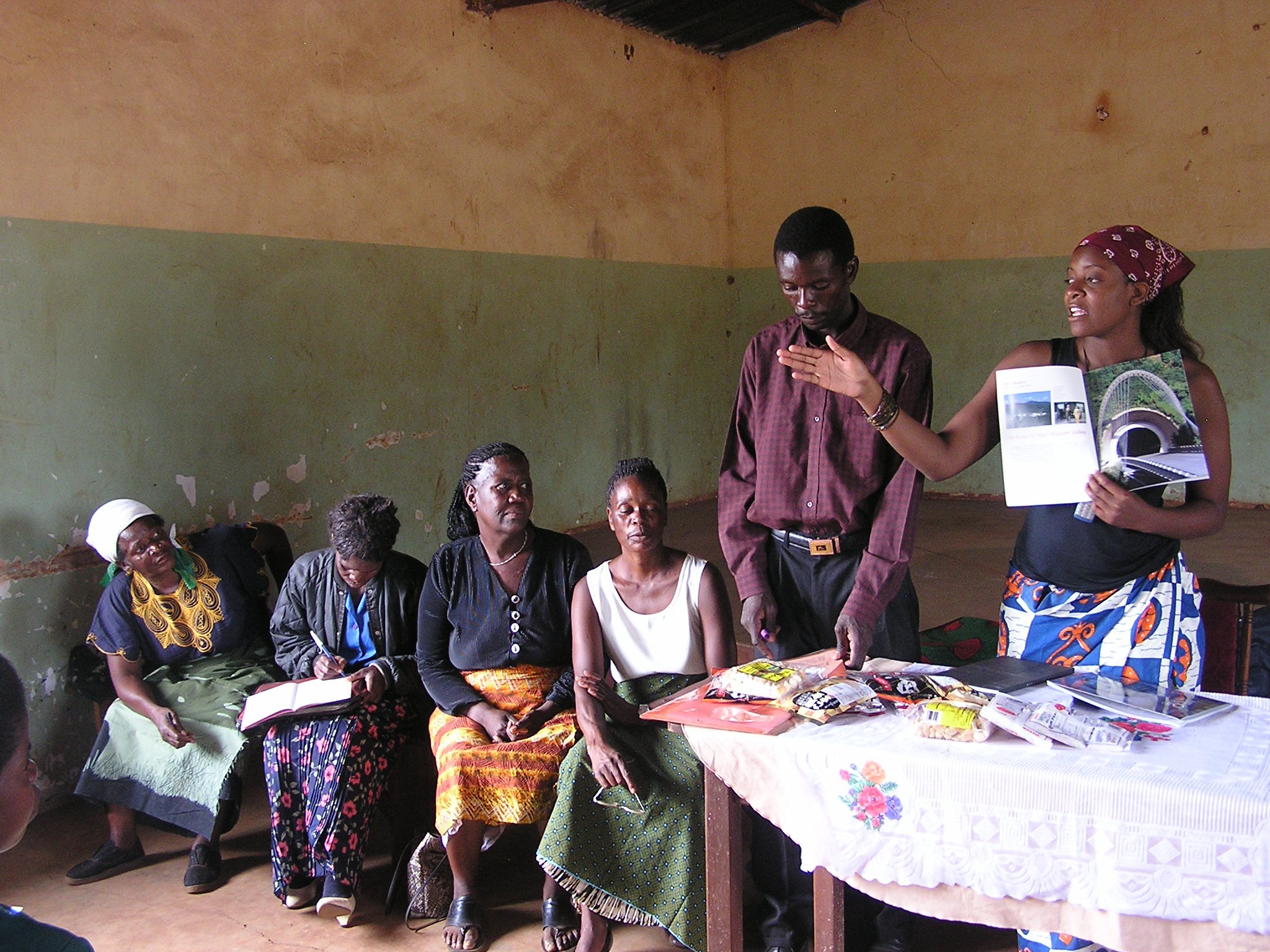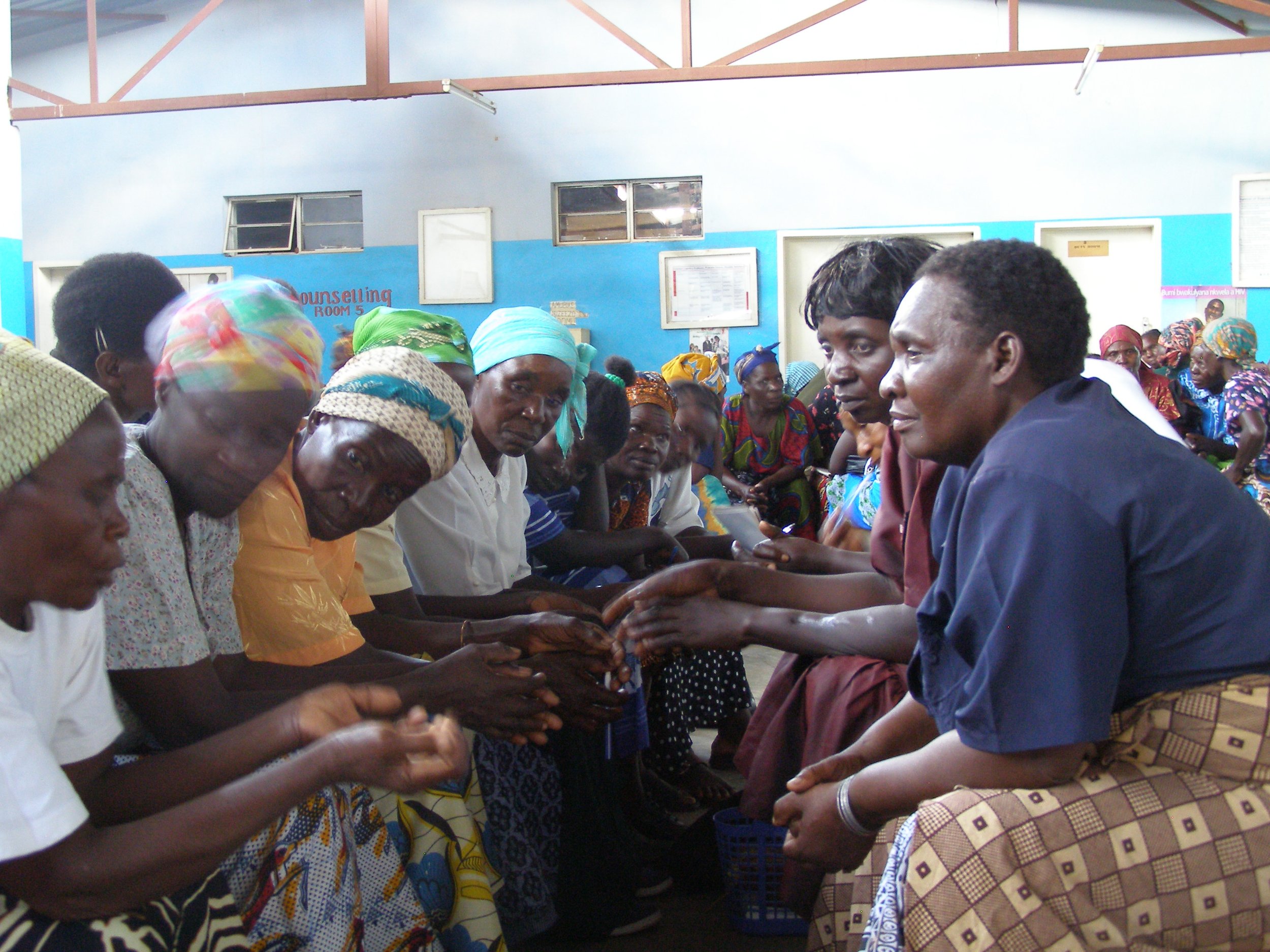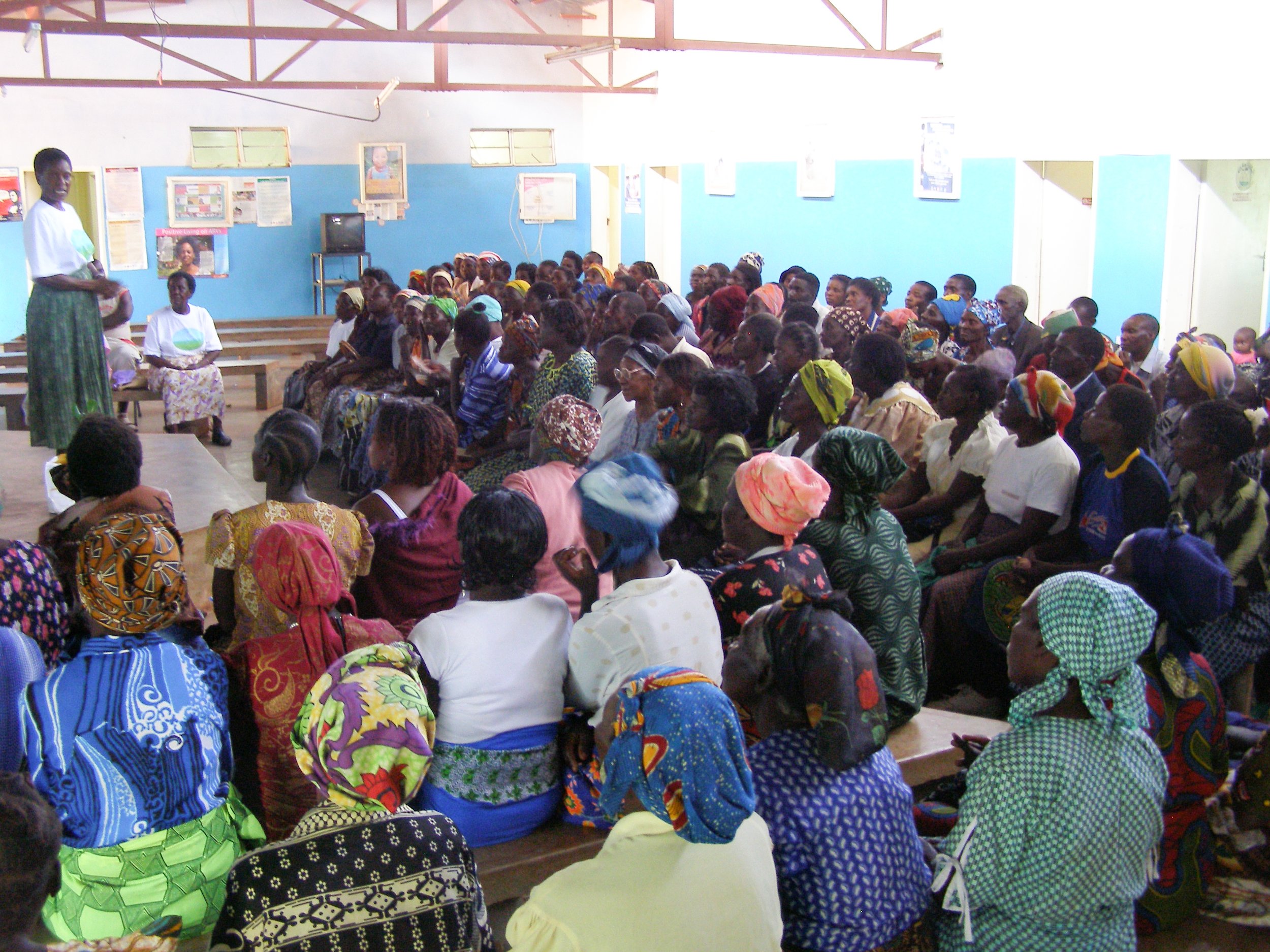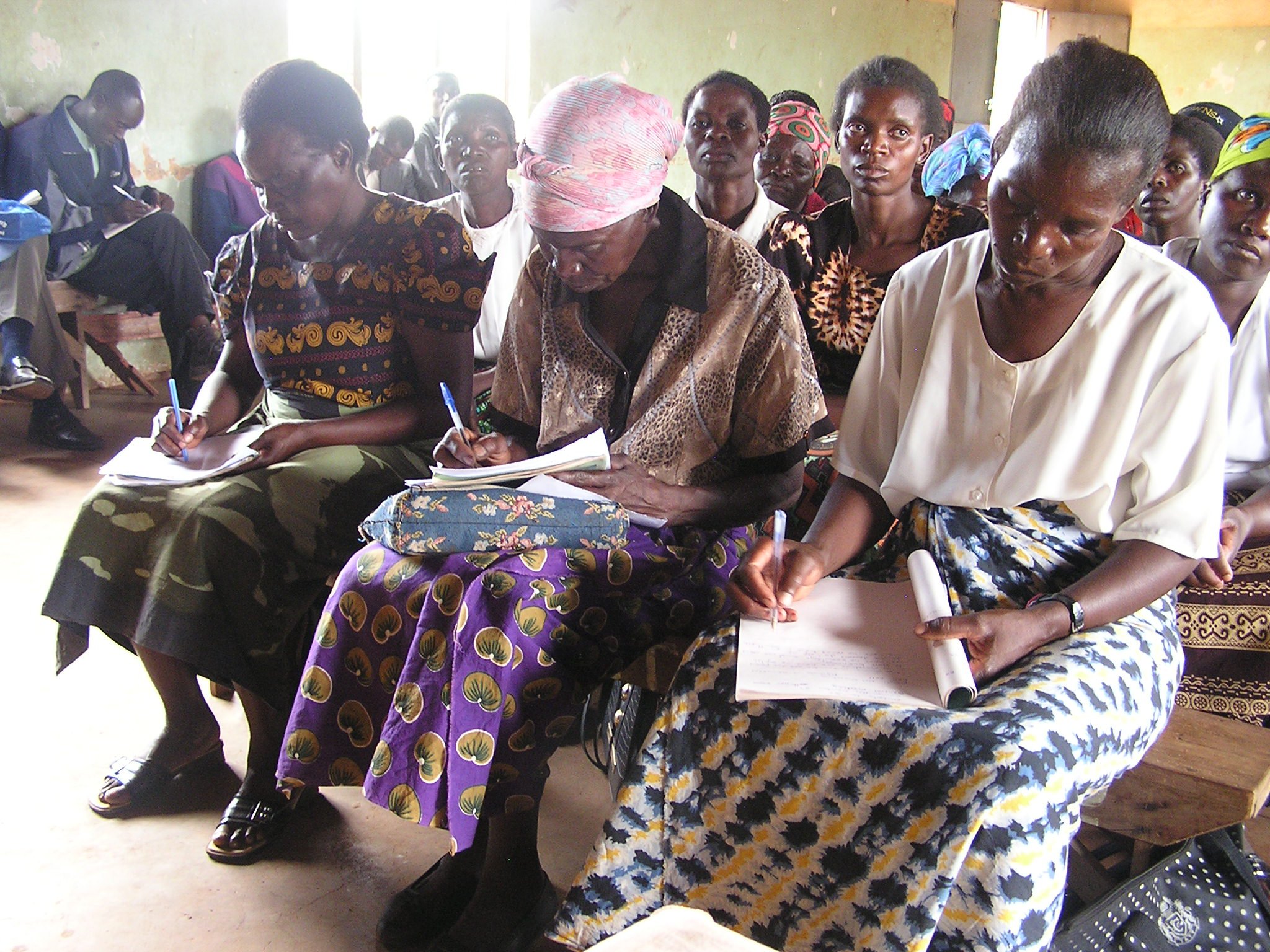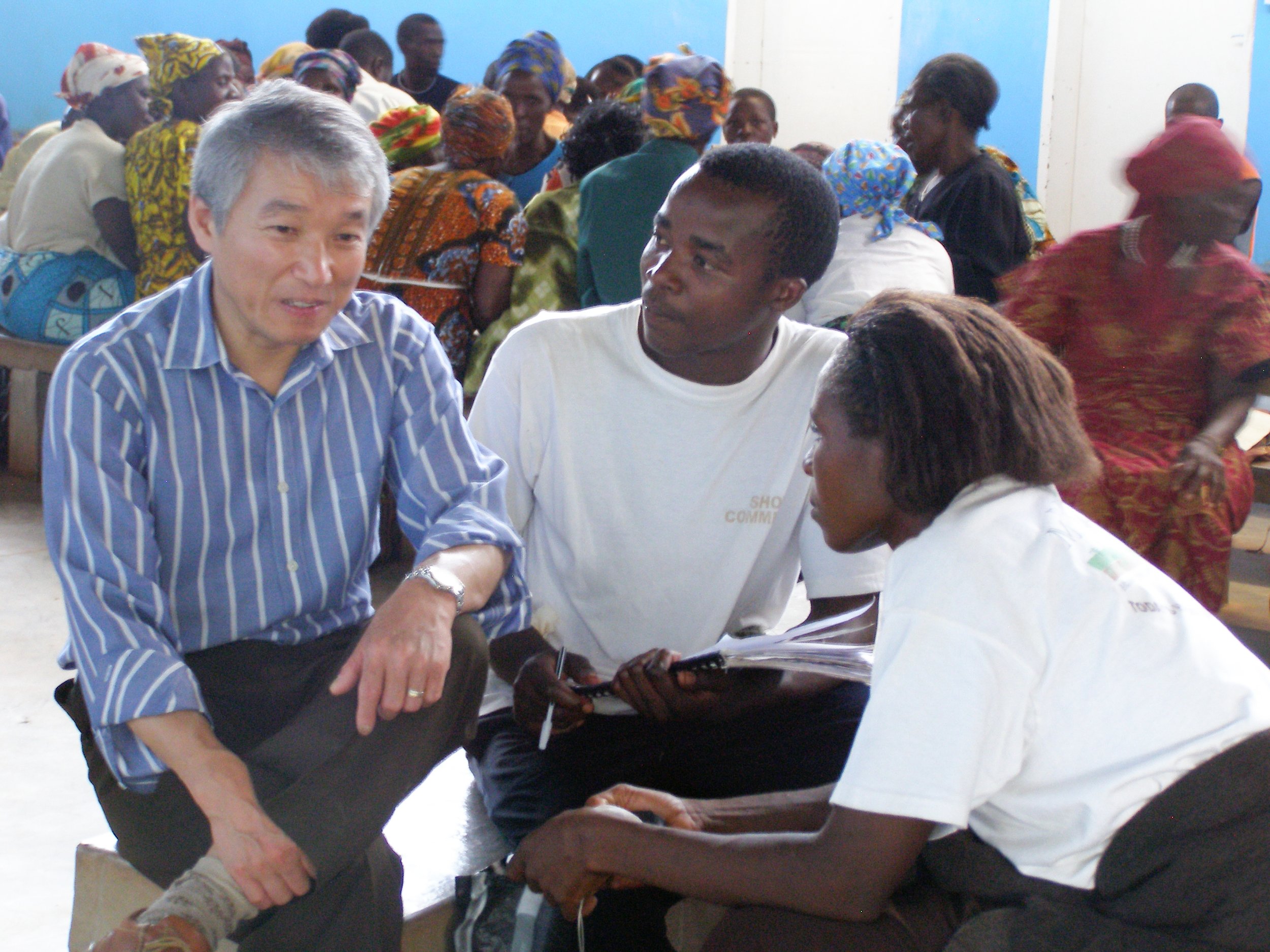Barbara Hachipuka Banda - founder of NADPZ
Barbara Hachipuka Banda is the founder and Chief Executive Officer (CEO) of the Natural Agriculture Development Program Zambia (NADPZ), an NGO that was established in 2005 in partnership with a non-profit organization called Shumei International. NADPZ aims to improve the quality of life of Zambia’s rural population by using an environmentally friendly farming method called Natural Agriculture. NADPZ currently works with over 6000 rural small-scale farmers in the Southern province of Zambia; educating them on the self sustainable benefits of Natural Agriculture and Seed Saving methods. Our mission is to support and stimulate initiatives, which will: Create and expand markets for Zambian natural agriculture produced products; Increase incomes of small-scale producers through partnerships with the private sector, agribusinesses, associations, and cooperatives. Rosanna chatted with Barbara to hear more about her work, challenges in sustainable development and what drives her to do her work.
Rosanna: Let’s start with how you came to work in sustainable development, what set you on that path?
Barbara: Originally, I'm a journalist by profession but before I graduated I realised I had a passion for development. I was always looking for work as a consultant or a volunteer on lot of projects in Zambia, whether it was girls empowerment, or HIV, AIDS issues. I was lucky enough that a role at UNICEF landed in my lap – they wanted to start a newspaper to educate young people about HIV and AIDS in Zambia. The idea was to educate people between the ages of 15 and 25 and teach them about the impact of HIV/AIDS and how to build their confidence and avoid circumstances that would lead them to being HIV/AIDS positive. I was selected by the three young women who ran this project, and you know they were they were an absolute inspiration, I learned a lot from them. They had started this HIV/AIDS newspaper and they needed an Editor in Chief and as young as I was, they hired me on the spot! And I thought, wow, I’m 20 years old and an editor in chief of a newspaper, this is fantastic.
I learnt that's where my heart and my passion lies and that I’m not a corporate person, it seemed I was a development person, and I guess that was really the opening story to my life. While I was working with them, the UNDP and the Global Peace Initiative for Women created a partnership around the Millennium Development Goals, around 2004 or 2005. They wanted to do a series of conferences with young people in different continents. The first one was in Africa and the President of Senegal agreed to host the first Pan African Youth Development Conference. Each country chose two young people, one woman, one man, and because of my work I was selected to represent Zambia. There were just over 150 young people from all countries in Africa and other partners, meeting in Senegal to discuss how young people could be involved with or participate in achieving the Millennium Development Goals. It was fantastic to meet all these other young energetic people who had projects on the ground.
I realised that working in HIV/AIDS is great as a topic to try and change things, especially in African countries, but I thought that one of the systemic or main problems in the Millennium Development Goals was poverty reduction. It plays a major role in achieving all the other goals and I found myself feeling very passionate and very strongly about that. In the process of being at this conference in Senegal, I was then selected to be the regional Chair of Southern Africa, so I would be in charge of monitoring youth projects within Southern Africa and reporting back to the community, monitoring how young people were participating and getting more young people involved. The next series then came up, which was the Asia Pacific Summit and I attended that as the Regional Chair of Southern Africa and had the opportunity to meet Shumei International.
When I attended the Senegal Conference I believed in poverty reduction, especially as I did a lot of travelling up and down to rural communities with my parents. My father was a politician, he was a Member of Parliament for the opposition party that had been created to save Zambia. He’s an accountant by profession, but he grew up in the rural area so he was also an avid farmer. We spent a lot of time visiting my parents village, because it was strong in their roots and they felt that as children , we needed to learn about where we came from. They would always take us out of the city and we would experience the no electricity, taking water from the river and being in the maize fields driving tractors - all this stuff.
When I went to Japan, I was still just representing how we could achieve the Millennium Development Goals, working on Goal 8 which is global partnerships, sharing experiences with other young people across different continents. The idea was sharing experiences to improve the thinking of the next generation, and actually change the world. I was very passionate, I was meeting other young people, I was sharing my story about what was happening in Zambia, especially with HIV/AIDS, and the poverty situation in Zambia as well.
Shumei International was the partner on the Asia Pacific Summit and so we got to visit a number of Shumei families who were all natural agriculture families. They taught us about the three philosophies, one being natural agriculture, the other one being art and beauty and the third is spiritual practice – it’s all about deep understanding and using your positive energy within you to share that with the rest of the world. When they shared their philosophy about natural agriculture, I was just floored. I thought about Africa and the begging bowl culture that exists and the farmers’ dependency on fertilisers and pesticides and hybrid seeds. And I thought about how this dependency had started.
If you look at our political history, we came out of colonisation in 1964 and gained independence, and then had 27 years of being a one party state, and in the 1990s we hit multiparty democracy. At the same time you saw the effects of letting the Western world in and one of those effects was the dependency that farmers have; they lost their cultural identity around farming. You can see the impact it had - yes in the 1990s it seemed great but, come 20 years later we're seeing the impact of that materialistic culture that we allowed into our country and that we allowed farmers to absorb. When I sat there thinking about Shumei International and about some of the women's groups my mother was working with, and her vision of how to enable women to be part of the development process, something just fit. It was like a jigsaw puzzle. We're not introducing a new type of technology or a new type of farming we're almost bringing back the original indigenous way of farming, and emphasising the importance of indigenous farming. I got really excited, I came home and said Shumei International is doing natural agriculture and I think it would work for you as a community, because it reintroduces what you used to do before.
That's how we got started, I went back and started to speak to people about how natural agriculture could be the key. There were a lot of negative and positive reactions because we were speaking to small scale farmers who could understand where I was coming from, but at the same time, poverty still existed. What farmers really wanted when I came back with the idea of partnering with Shumei was more yields, more money in the pocket, and what I was proposing was taking them back in time, with no guarantee of making that money they were aspiring to. That's my history of how I ended up getting connected to agriculture.
Rosanna: Please could you give an overview of what natural agriculture is, in case anyone reading doesn’t know?
Barbara: Natural agriculture is basically a way of farming that takes away the dependency of inputs like pesticides and fertilisers with hybrid seeds, so it's completely natural, it's like organic farming, but we eliminate the use of additional food, additionally feeding the plant. So we don't use organic manure, we let the plant do its thing and grow by itself. The key components of natural agriculture are firstly, saving seeds by working with indigenous seed varieties that have the capacity to adapt to changing weather and climate conditions (like severe drought or flooding). The seed itself has the strength because it has the root system that exists to help it survive through a lot of those climate issues.
The second key component is soil management. For this we’re looking really at land management, for farmers to grow on smaller portions of land which will help them manage it better and ensure increased yields. As opposed to clearing 12 hectares of land and coming out with two bags of corn or two bags of peanuts. With one hectare you can multiply that even by 10 with good management.
The third component is protecting soil. Soil is the key to carbon sequestration and solving the current climate crisis. Instead of clearing large fields of land, creating deforestation and requiring high fuel or energy use to manage the land, we use smaller portions of land. Therefore, you haven’t cleared the land completely and when there’s heavy rains or wind, you don’t get the topsoil running off. We separate the dependency on fertilisers and any pesticides because what ends up happening is you kill the soil, if you look at tobacco farming which became one of the biggest industries, especially in the 80s in Africa. They had 20 to 30 hectares of land and you can only grow tobacco in one cycle. Then you use so many chemical inputs, the land dies and you have to move to another location to start planting again. Then it takes the soil another seven to ten years to come back to being healthy after all the chemical inputs. It’s essential to sever that dependence on chemical fertilisers because we're looking at future generations and what they're going to have in the end. So we must make sure the soil recovers. We mulch the soil, we don't create compost we use natural products; dry leaves, ryegrass, to mulch the soil which acts as a cover to protect the soil during non-planting season. Then during planting seasons the cover acts like an absorption net for water in times when there's drought. As when the land is bare and hard, it can rain but the water doesn’t sink in, it runs off but, if you've got moisture cover (dry leaves, dry grass) it allows for easier seepage into the soil.
Then our focus is not to feed the plant, if you look around you in everyday nature trees and plants grow everywhere, no one is there to feed them. If you look at indigenous seeds, if you feed it, the root system becomes lazy - it reaches up top to eat. Whereas, if you allow it naturally do what it needs to, the root system goes deeper looking for food sources and water sources underground. This ensures a stronger healthy root system in case of any natural disaster that might happen. So that's natural agriculture for us, growing everything naturally and allowing nature take its course.
Rosanna: Why does your project particularly emphasise women’s empowerment and the role of women in agriculture?
Barbara: At least 85% of Zambia’s population lives in rural communities and about 15% are in cities. We see in everyday life that women take the lead and hold the reins, and in order to progress or develop any society or community, you will do better if you actually involve women. Because they aren't just the people responsible for households or children, they're the people responsible for communities. They feed the wider community, so you know in African culture we say to educate a woman is to educate the community. If you educate one woman, she’s likely to teach 100 other people, it's almost like a pass it forward type of thing, as she impacts or has contact with a lot more other people.
That's why we felt that if we wanted our message to be heard, let's focus on women, because they are not only the communicators or the people that hold the communities in their hands, they're the labour force in farming. In African communities men own the land, while women and children work the land. They’re the ones who plough the fields, who plant the crops, reap the fields, the ones who make sure the harvest is in. They're not supported, whether it's with infrastructure, whether it's economically, there is no support for women, but if you leave women out of the equation, society can’t develop. We have to do it together, women are part and parcel of the development process.
My mother strongly believed that and before she passed away, this was her passion and her life's work -that women are the key. She was a politician's wife, but she always used to say, without me your father is nothing. And my father always used to say behind every successful man is a strong woman - that's the type of environment I grew up in, and why my work is based on what my mother taught me. It's based on looking at our societies in the past and today, and how there's not much support for women, and the importance of building that support.
Rosanna: What do you think are the advantages of a development project which is locally lead, as opposed to being run by an external NGO or development organisation?
Barbara: There are two advantages, sustainability and longevity. The people in the communities I’ve worked with aren’t dependent on my existence or on the existence of someone from the city who has decided to educate them. It's dependent on the fact that they are passionate about it and they'll continue to carry on even without my participation.
If you had done it a different way, where we had hired offices, hired all the people who have just finished university to go into these rural areas to teach communities and given the project a two year timeline, I guarantee, three years after the project finished, we would have gone back to the same rural community and the project wouldn't have existed. Everybody would have been talking about this project was there and they built this, but even that building has broken down…
The key to locally led projects is that they carry on because you've left a group of people who you've educated and are passionate about continuing improve their livelihoods. The disadvantage of it, though, is it takes longer and requires more commitment. These are the type of projects that don't require a timeline and a budget, it requires just a long, long commitment that, eventually, one day, you will see the results of. But, if you're planning to see them in three years to five years it just doesn’t work. And this is what a lot of UN or government projects are about now. They have a three year, maximum five year financial window and then after that the data collected shows the impact on 50,000 farmers or something like that. This is the problem that we have with the COPs, at a lot of the conferences it's all about statistics. But, if we take those statistics and ask about your work with 200,000 farmers, will you be working with those 200,000 farmers in in five to ten years? Will those 200,000 farmers have continued the practice you gave them five years before? It can look good on a report at a conference in that year, but the question is, let's report on the same project ten years later,
A lot of people say to us that our numbers seem to have stuck at 5000 to 6000 farmers, they should be going up to 10,000 now. But, it requires a hell of a lot of commitment and it requires not only donor support, it requires government participation and commitment. Without the government it's highly unlikely any project will be able to scale up, because only government has the necessary infrastructure. We’re not working with the government yet but the current leadership are very strong on green economy, they’ve even created a Ministry of Agriculture and Green Economy. They are planning for climate change and supporting farmers, and the current President has a background in farming and is still a farmer – so we are hoping this government will be different.
Rosanna: Do you think we need to rethink how we define ‘development’ – often it’s perceived of moving from rural areas to cities and getting a white collar job and leaving behind traditional rural livelihoods?
Barbara: The funny thing is, some years ago we had Shumei come down; they would come for regular trips before Covid. For them, it was great to be in a rural community in Zambia but they seemed very disturbed by the fact that when we first started the project, they were no roads to get to project sites. A 30 minute trip would take almost four hours because you'd be driving at the slowest pace. Then once you drove into the rural area, there was no cell phone signal – it was totally detached from the rest of the world, no internet, no electricity. They would have to carry a satellite phone just for safety, because they felt really disconnected. But, over time, the government came in and put in more infrastructure, they put in more roads, so the four hour trip started taking us 30 minutes. Then all of a sudden mobile companies came in and started putting satellites up. One day, you’re all sitting under a tree and everybody's listening to you, then suddenly it’s 10 years later everybody's got a cell phone, you're in a meeting underneath the tree and somebody's phone rings. And we had a discussion with Shumei about how they felt like it was destroying what’s natural, that the communities should be wary of these new technologies because of everything they had gone through in Japan, and the atomic bombs and this and that – we had the whole conversation.
I said to them, one of the things you must understand it's human nature to want to feel like you've gone up and developed. Then, at the same time, once you reach the top, it's human nature then to feel dissatisfied and then want to come back to the natural state. We all want to experience it then after you've experienced it, you realise it's not what is cut out to be, I miss the world that was there before. With Zambia and African countries, especially with the exposure we've had during democracy after colonisation, exposure to the Western world, specifically America and the UK, everyone wants to live the American Dream. In our education system, we were taught books like The Great Gatsby and about the American Dream. Everybody unfortunately wants to live the American dream, they want to focus on being materialistic to begin with, but everybody at the end of the day comes back. It’s also about what propaganda you're selling people and the type of people you're selling it to. I grew up in the city, my parents did send me to British education schools. My father worked for the mines for a very long time. I grew up in a privileged household, even if we grew up in a household with so many cousins and brothers and sisters, because my parents adopted a lot of their siblings’ children and things like that. So, I grew up in a down to earth environment, it wasn't like a lot of my friends who were flying to the UK every summer. We were dropped off at my grandmother's farm to run around the maize field. But, I wouldn't change a single thing about my life as a child. The thing that I’ve noticed is now is there's so much greed in the world, people are selling these images of wealth and the life you ‘should have’ but for somebody coming from a rural background all they can do is wish.
We have to hope that people will catch on now to the problems that materialism is causing – often we hear of people talking about the need to increase yields to feed the growing population, but it has nothing to do with yield and everything to do with greed. We have more than enough food to feed the population of the world, the problem we have is distribution and infrastructure. When that wealth exists, you know there's a lot of wastage going on with restaurants and supermarkets and food chains that throw away tons and tons and tons of food on a daily basis. How do we get that food to poor communities? We need better infrastructure and systems but, in a lot of cases, people won't because they're making more money in circumstances like that.
It's a very hard question, can development happen without destroying our souls? I think that's the thing we need to understand, that it can happen, the question is how can it happen. I think there's a lot of stories and examples we can listen to, but it's about creating a synergy and the network that will build the better world.
A huge thank you to Barbara for taking the time to be interviewed.
Read more about her NADPZ and Shumei International.
Barbara is looking for volunteers to come to Zambia and teach locals different livelihood skills. If you are interested, get in contact through the website.

